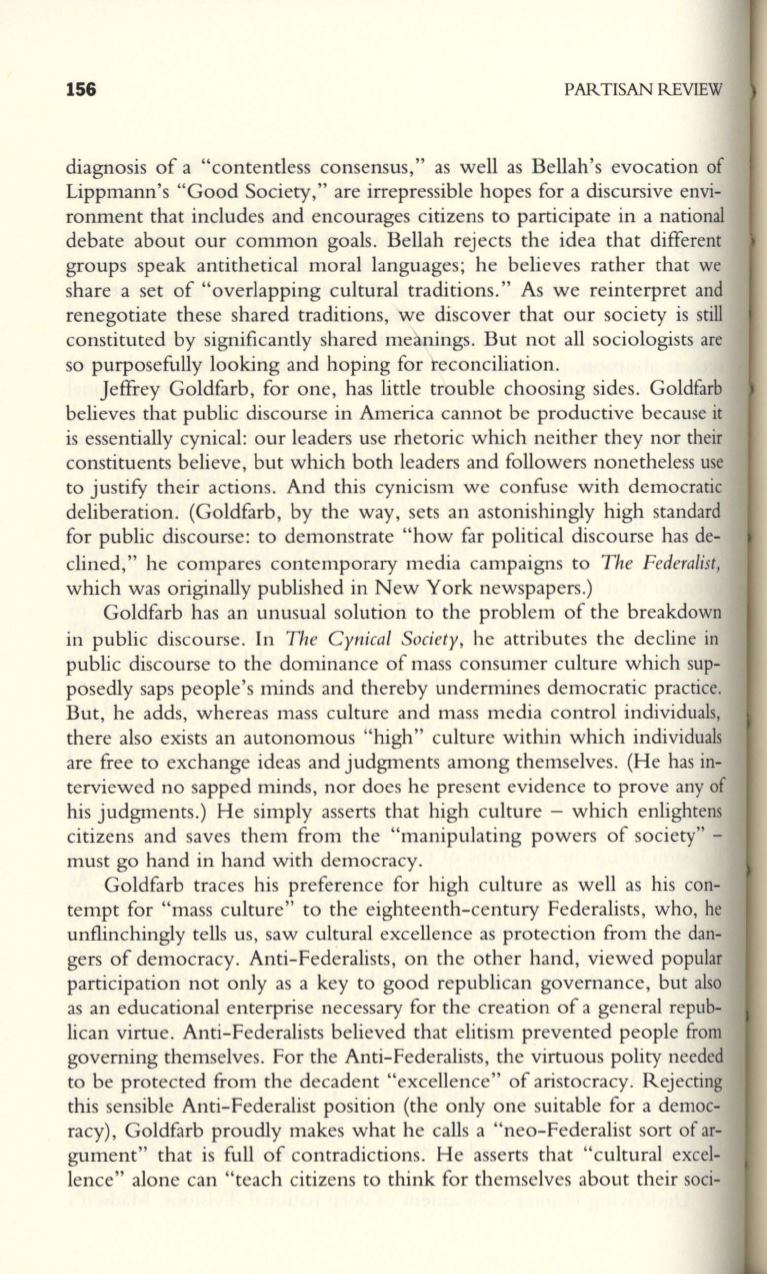
156
PARTISAN REVIEW
diagnosis of a "contentless consensus," as well as Bellah's evocation of
Lippmann's "Good Society," are irrepressible hopes for a discursive envi–
ronment that includes and encourages citizens to participate in a national
debate about our common goals . Bellah rejects the idea that different
groups speak antithetical moral languages; he believes rather that we
share a set of "overlapping cultural traditions." As we reinterpret and
renegotiate these shared traditions, we discover that our society is still
constituted by significantly shared meanings. But not all sociologists are
so purposefully looking and hoping for reconciliation.
Jeffrey Goldfarb, for one, has little trouble choosing sides. Goldfarb
believes that public discourse in America cannot be productive because it
is essentially cynical: our leaders use rhetoric which neither they nor their
constituents believe, but which both leaders and followers nonetheless use
to justify their actions. And this cynicism we confuse with democratic
deliberation. (Goldfarb, by the way, sets an astonishingly high standard
for public discourse: to demonstrate "how far political discourse has de–
clined," he compares contemporary media campaigns
to
The Federalist,
which was originally published in New York newspapers.)
Goldfarb has an unusual solution to the problem of the breakdown
in public discourse. In
The Cynical Society,
he attributes the decline in
public discourse to the dominance of mass consumer culture which sup–
posedly saps people's minds and thereby undermines democratic practice.
But, he adds, whereas mass culture and mass media control individuals,
there also exists an autonomous "high" culture within which individuals
are free to exchange ideas and judgments among themselves. (He has in–
terviewed no sapped minds, nor does he present evidence to prove any of
his judgments.) He simply asserts that high culture - which enlightens
citizens and saves them from the "manipulating powers of society" -
must go hand in hand with democracy.
Goldfarb traces his preference for high culture as well as his con–
tempt for "mass culture" to the eighteenth-century Federalists, who, he
unflinchingly tells us, saw cultural excellence as protection from the dan–
gers of democracy. Anti-Federalists, on the other hand, viewed popular
participation not only as a key to good republican governance, but also
as an educational enterprise necessary for the creation of a general repub–
lican virtue. Anti-Federalists believed that elitism prevented people from
governing themselves. For the Anti-Federalists, the virtuous polity needed
to be protected from the decadent "excellence" of aristocracy. Rejecting
this sensible Anti-Federalist position (the only one suitable for a democ–
racy), Goldfarb proudly makes what he calls a "neo-Federalist sort of ar–
gument" that is full of contradictions. He asserts that "cultural excel–
lence" alone can "teach citizens to think for themselves about their soci-


